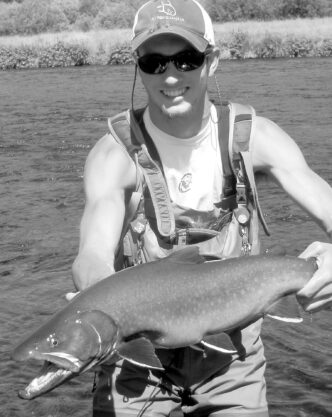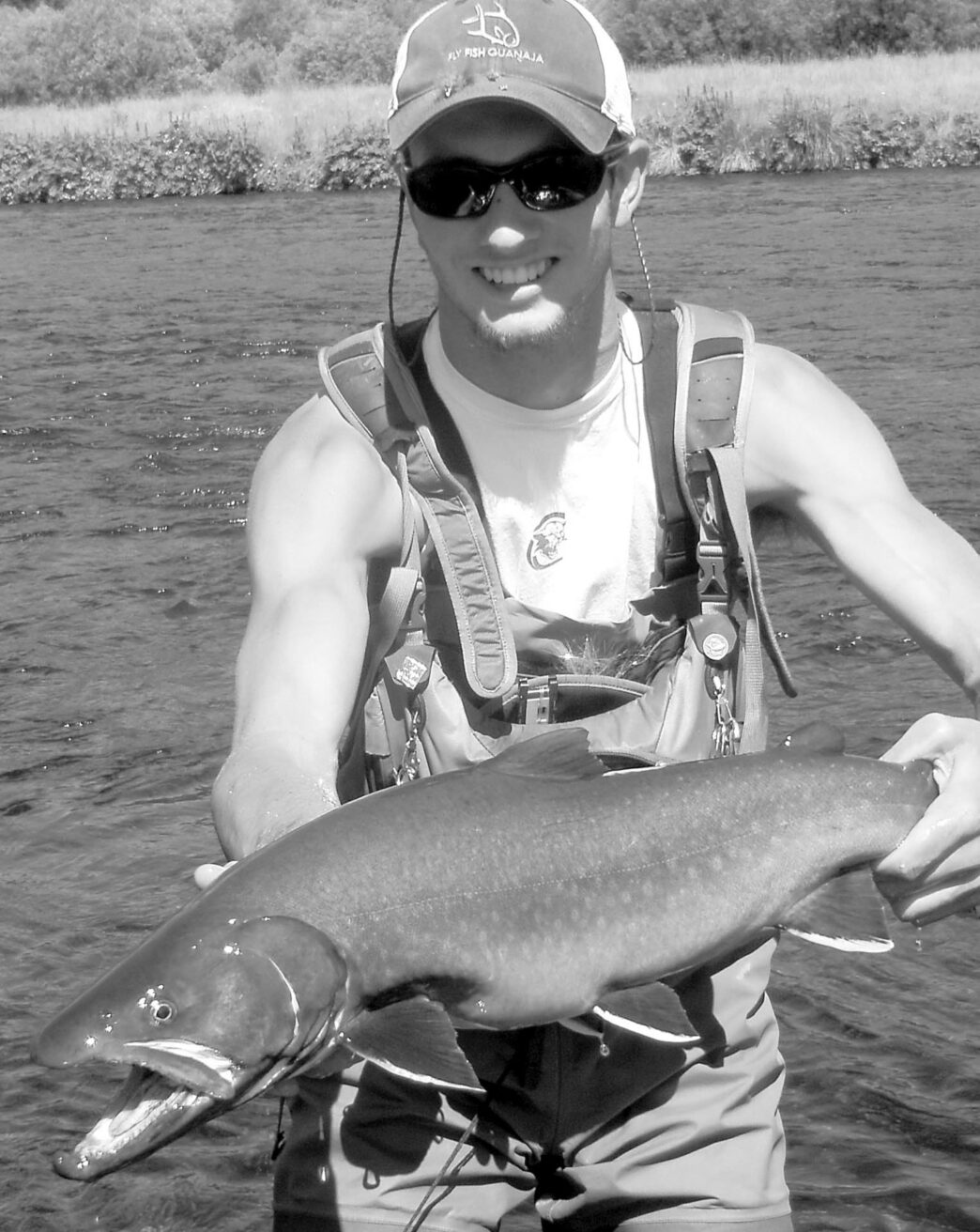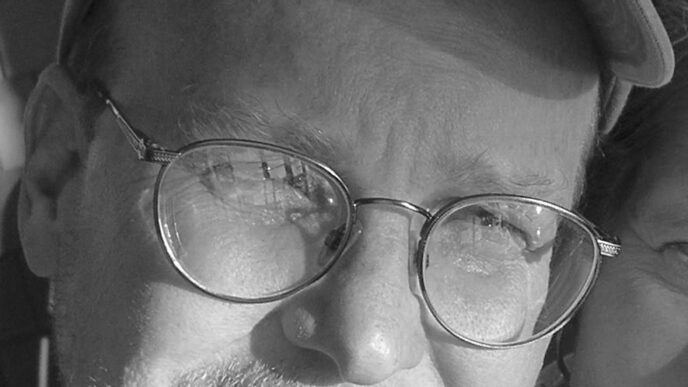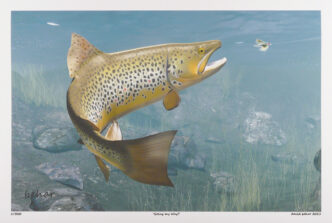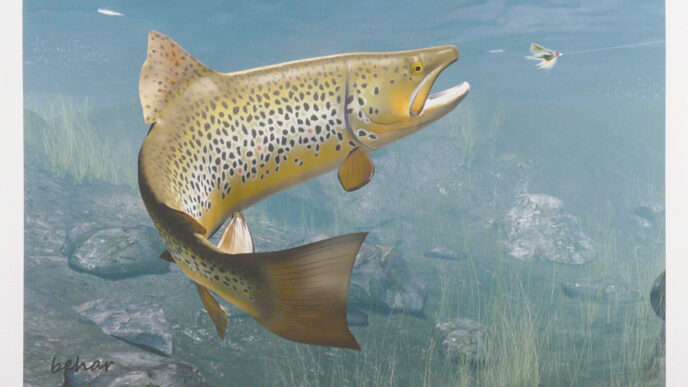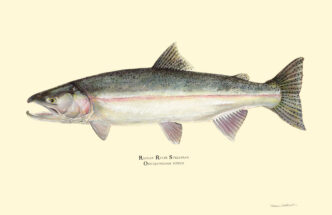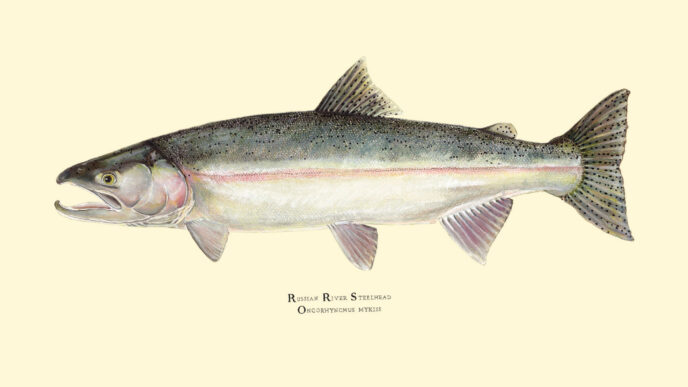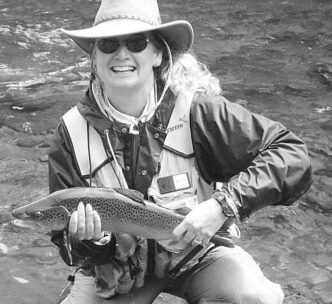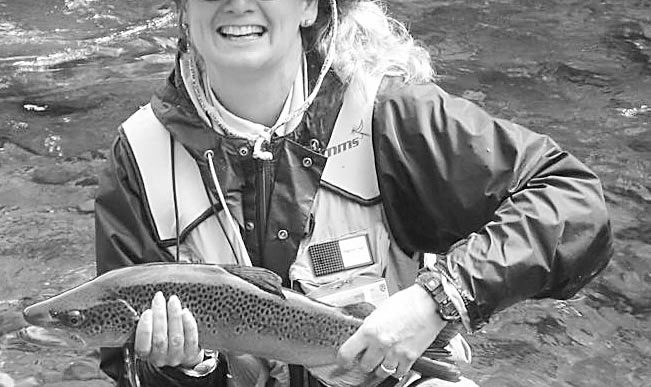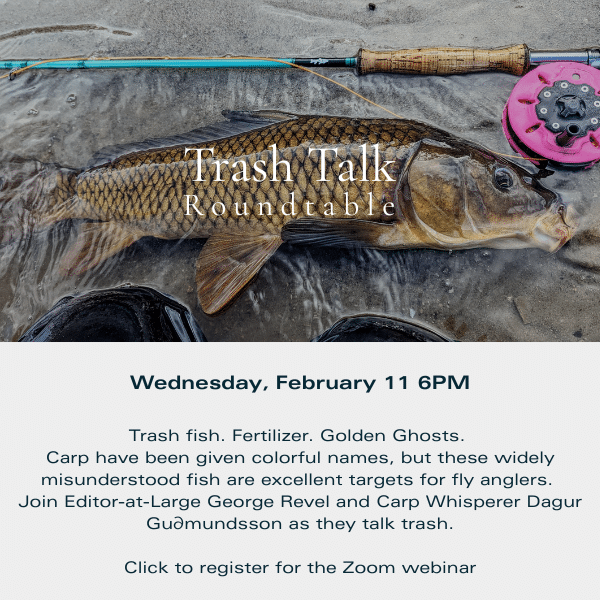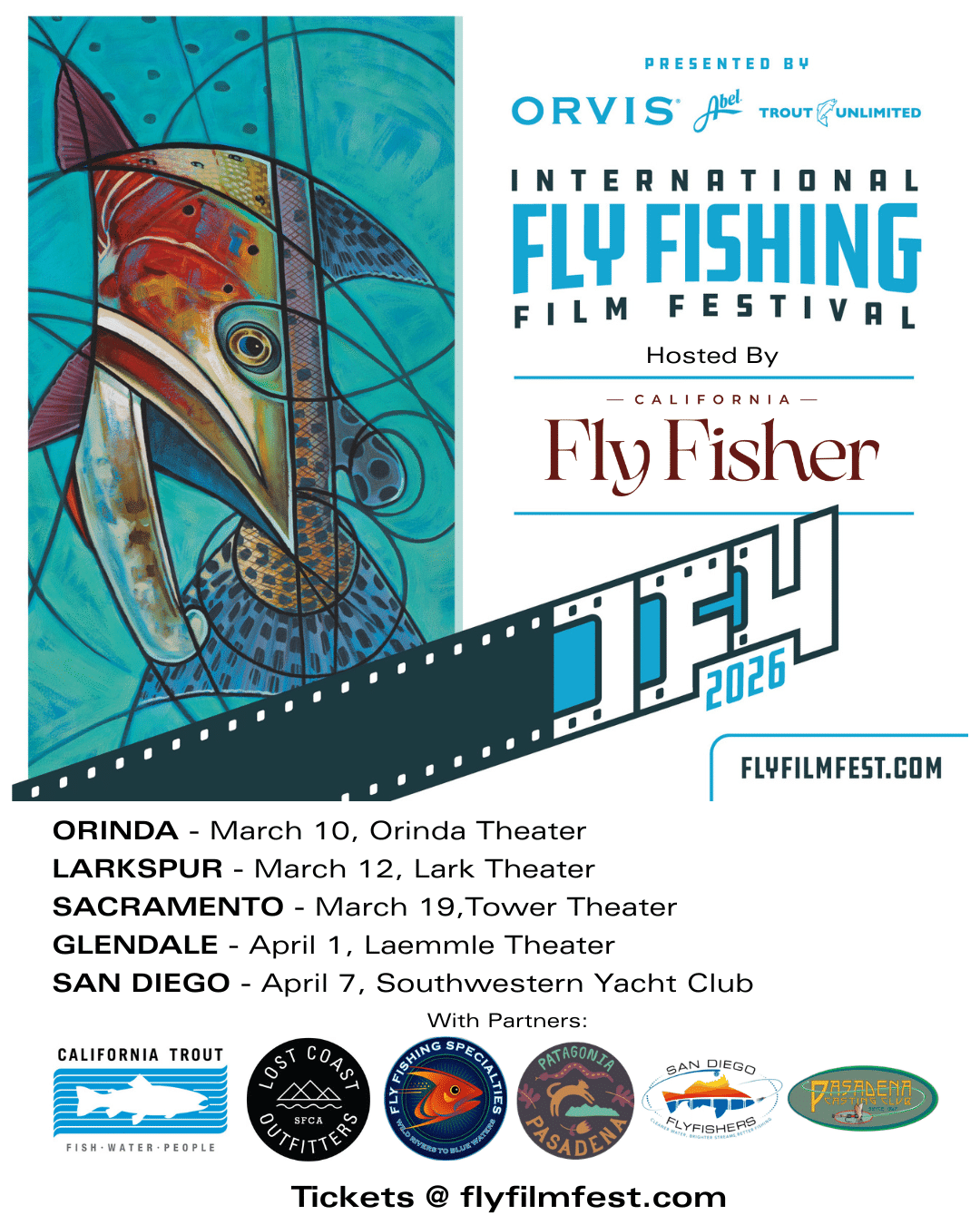Most of us fish as an avocation, as something we do for enjoyment, an addition to what life has called us to do as the principal employment of our lives and energies. But for a lucky few, fly fishing is a vocation in its own right, a calling that is itself where their lives and energies find expression. When you talk to the professionals who conduct the business of fly fishing — the guides, the casting champions, the rod or reel designers and builders, the retailers — you learn that this has been the case with an uncommonly large number of them. It certainly appears to be the case with Robbie Wirth, a senior at Campolindo High School in Moraga, who started fly fishing at age six, tying at age eight, built a drift boat at age fifteen, ties flies commercially while still in high school, and who recently was a member of the victorious U.S. team in the World Youth Fly Fishing Championships, held this year in Sansepolcro, Italy, on the Tiber River, as part of the Sport Fishing World Championships, where he also finished tenth overall in the individual competition. Most of us find something important in fishing.
Robbie finds himself there.
Bud: You’ve been fly fishing since you were six and tying flies since you were eight. What was it that seemed attractive about fly fishing at such an early age, and what kept you interested as you grew up, entered the early stages of testosterone poisoning that we guys all experience, and encountered all the other possible interests, from other sports to Facebook, that pull at a kid in high school?
Robbie: For as long as I can remember, and even before that from what my parents tell me, I could be found wandering around creeks, streams, ditches — anything that had running water — catching crawdads and trying to catch fish in any way possible. When I turned six, my uncle gave me my first fly rod and took me on my first fly-fishing trip. We went to British Columbia with my grandfather, my dad, and all my uncles and several of my cousins.
After that, I was hooked. I watched the Saturday morning fishing shows, read books and magazines, went to the local fly shop to ask questions, and continued on my own in every spare moment I could find. What started out as a hobby became a passion bordering on an obsession. There was no place I’d rather be than on a river, catching fish, or at least trying to catch fish.
And I always found a way to stay actively involved, even on those days when I could not get out on the water, whether it was tying flies or just reading anything I could get my hands on. I never wasted my time on the computer or video games — they just never appealed to me.
Bud: What is it about the sport that creates this passion for you?
Robbie: All my life, I’ve been obsessed with the outdoors and spending time on the water. I don’t know exactly what it is, but something about being outside, wading on a river, and not having to worry about anything else in the world is what life is all about for me. The river feels like a home. If I had the chance to live on any river right now, I’d take that in a heartbeat, even if I had to rough it for the rest of my life. Fly fishing, to me, is something I think about all the time, dream about all the time, and do all the time. Fly fishing is a sport that challenges you every time you go out. It’s like a puzzle — to be successful, you have to figure out something new every time you go out. Whether it’s the water or the insects or where the fish are holding, there are new puzzle pieces to be fit together every trip. When you get all the pieces together and figure the fish out — you move on to a different piece of water and try to do it all over again. And then before you know it, you’re driving 10 hours a day just to get in 5 hours of fishing.
Bud: I realize that you are indeed just a kid in high school and by no means a spokesperson for “the” kid in high school, but I’ve read that you also guide friends who might be interested in fly fishing, and one of the recurring topics in angling magazines like this one and in fly-fishing clubs, which tend to be populated by geezers like me, is how to secure the future of the sport, since the average age of fly fishers seems to be creeping ever upward. What attracts your friends to fly fishing, and how do you amplify and consolidate that attraction?
Robbie: I try to spread my love for fly fishing to any of my friends — boys or girls, younger or older — who show any interest. I love to introduce them to the thrill of seeing a nice fish turn and take their fly and then the exhilaration of the fight that follows. It’s rewarding to teach them the knots, how to cast effectively, how to mend their line, and to enjoy the beauty of the outdoors. As the old saying goes, the fishing is always good, even if the catching is a little slow. Many of my friends ask to fish with me because they know all I’ve done, and I try to get them hooked.
I am also involved in an organization called Cast Hope. This is an organization run by a friend of mine, Ryan Johnston, who tries to get young people involved in fly fishing. He holds clinics and gives out free guided trips to try to get the youth involved in the sport. You can see the great work he does at http://casthope.org.
I recommend to any kid who wants to get involved in fly fishing to look up the Cast Hope organization and see what they have to offer. It can help jump start your involvement in fly fishing, and you can learn a lot of new things.
Bud: The occasion for this interview is your victory as part of the U.S. team in the World Youth Fly Fishing Championships. Competitive fly-fishing is at one end of a spectrum in the sport, with the intellectual and physical challenges involved also leading, at the other, to personal metaphysical or spiritual rewards. What attracts you to competitive angling, and what do you say to those who grumble that competition isn’t “really” what fly fishing is all about?
Robbie: At first, the competitive aspect of fly fishing appealed to me because I simply wanted to take my skills to the next level. No matter what you do, if you take some-thing one step further, you are going to learn a lot of new things and meet a lot of new people. I never got caught up in the debate about whether competition somehow diminishes the purity of the sport — I just wanted to learn more and be around even better anglers. In the three years that I’ve been competing, I’ve met lots of great fisherman of all ages — from the legendary Joe Humphreys to numerous kids my own age from countries around the world. We all have one thing in common — a love of the art of fly fishing.
I feel like I’ve made lifelong relationships and gained knowledge that would have taken me a decade or more to figure out on my own. I have become twice the fisherman I was when I started, and I’ve experienced different cultures from around the world that no other teenager would get to experience at such a young age. Competitive fly fishing also pushes me to think outside the box and fish in ways I normally wouldn’t while fishing the streams around my house. I’ve had to learn new techniques, and in competition, every single fish I land makes a difference. I fish as hard as I can for the three-hour session, and then right away I begin looking forward to seeing how many fish other competitors caught, how I placed in the standings, and what I can change to do better in the next session. It can get really intense at times, but I enjoy every second of it.
Bud: Fishing with others as friends is something that most of us do, and it often combines elements from both ends of the spectrum I mentioned above, but fishing as a “team,” as you’ve done in these competitions, is something else again. Describe the competition and how the U.S. team prepares for it as a team.
Robbie: As much as fly fishing would seem like an individual sport, the team aspect is actually really important. Every year, we get together, usually in Pennsylvania, and just fish for a week. Its not really even practice, but more like fishing with your buddies for a week. At these practices, we have multiple members from the U.S. Men’s Team who help us individually with perfecting new techniques.
When we get into the competitions, the team as a whole really has to work together. In the days before the competition, we all work hard to figure out what is happening with the water and what the fish are keying on. We all fish different flies and different techniques. After every session, we sit as a team and compare what flies were working, where the fish were holding, and what techniques were working. One person can’t win the competition on his own, and this year, our team worked together to win this competition. Together, we are all better than any one of us could be individually. I really love the spirit of togetherness and the camaraderie we share with one another.
Bud: You’ve been competing in these “World” competitions since 2009. They’re held on European rivers, but you train on American waters. Does learning to compete successfully mean emphasizing “European” techniques, such as Czech nymphing? Does what you learned as an angler growing up on Western rivers translate well into these other contexts?
Robbie: I’ve competed in the Worlds in Slovakia and Italy, and I would say the rivers are pretty similar to those in the United States. As for techniques, we worked hard on Czech nymphing techniques in the United States so we’d be ready to use them in Europe. I actually think we work on a wider range of techniques than many of our competitors from Europe or South Africa. For instance, we tend to fish a lot of dries and streamers, which helps us in competition, because the Europeans don’t seem to practice these techniques as often as we do.
Bud: As a fly-fishing competitor, you’ve used a wide variety of techniques, but when angling on your own, for recreation and pleasure, what’s your preferred way to present a fly to a fish? Do you have any favorite fly patterns?
Robbie: When I came into competitive fly fishing, I was thrown into a new world of techniques, ways to present flies, and many new patterns. Most of these new techniques were European nymphing techniques such as French or Czech nymphing. Although nymphing for the most part is the most productive way to catch fish, my favorite technique has always been a tie between dry flies and streamers.
First of all, dry-fly fishing is by far the most challenging. When casting to big, finicky rising fish, the perfect presentation is needed, along with the right pattern, to get one to come up and take the offering. Lately, I’ve been fishing with longer leaders that allow me to get a longer, more natural and drag-free drift.
It’s way too hard to pick my favorite dry fly, but if I had to choose two, I would have to pick the CDC and Elk, as well as a mayfly pattern that I designed called the Slovakia Special.
Streamer fishing is a whole different story. You can work all day, fishing hard and throwing streamers up close against the bank, all the while still waiting for that big hit. There’s nothing better than feeling and sometimes seeing a big fish come up and slam your streamer. Some of the best streamer fishing that I’ve ever done was in Italy in my last two sessions at the Worlds. Everyone had been fishing the runs and the seams and had pushed all the fish up under trees. Because of the overgrown banks, I didn’t have any room to back cast, so I was loading up the rod bow-and-arrow style and shooting my streamer back under the trees. Almost every time, on the second or third pop, a fish would come up and slam it.
As for favorite streamers, I believe that it doesn’t depend as much on fly selection as on color selection. A lot of factors kick in, like water clarity, weather, and how fast the water is moving. One favorite is a Slumpbuster in olive, black, or brown.
Bud: By now, you’ve fished all over the United States and in Europe. I’ve read that you’ve even fished Walnut Creek and San Leandro Creek at home in the Bay Area. What’s your favorite river, and why?
Robbie: Out of all the places I’ve fished, my favorite is the Metolius River in central Oregon. This is where I first started learning and falling in love with the sport. The headwaters of the river emerge from two beautiful springs at the base of a mountain butte, it runs at a nearly constant temperature and flows all year long, and is simply one of the most beautiful rivers I’ve ever fished. Best of all, it is a tough river on which to catch smart native fish. I go there every year for a family reunion in the summertime, and as a young boy, I always would pester my uncles until they’d take me out there to fish. Now that I finally have a drivers license, I don’t need to wait for anyone.
Bud: Tell me about building a drift boat a few years ago.
Robbie: When I first started fishing, I loved to go out in my uncle’s boat, which he built when he was in college. Ever since then, I wanted to build one for myself. From the time I was eight years old, I saved up the money to buy the materials and directions. When I was a freshman in high school, I broke my leg and tore up my knee playing football, and after surgery, I had to go through rehab for nine months. I used that as my window of opportunity, and my dad and I spent nine months in the garage working with power tools, listening to music, smelling the sweet aroma of freshly cut wood, and gradually seeing my boat take shape.
At the end of the process, I am the proud owner of a classic 16-foot wooden McKenzie River drift boat. I still work on the boat from time to time, when I don’t have it out on the river, and make new additions (seats, cooler, anchor system) in my wood-shop class at school. For my next project, which probably won’t happen for a while, I’d like to build a Montana Boat Builders stitch-and-glue boat.
Bud: What’s next for you? It looks like half the U.S.A. Team either attends or will attend Penn State. Are you heading on to college? Guiding? What?
Robbie: Although most of the team goes to college at Penn State, I’m thinking of staying in the Western United States. I am looking at schools in Montana, Colorado, and Idaho. I’d like to go somewhere that I can go fishing and skiing in the same day and still have time to do homework. I’ll eventually work as a guide, but I’m not sure how long I’ll do that. It might end up being a summer job before I find something else that will probably be in the fishing business, as well. I also want to continue my competition experience. After I finish college, I’d like to try my luck with the U.S. Men’s Fly Fishing Team and see what else I can learn.
Bud: Here we are at the traditional Silly Tree Question. If you were a tree, what kind of tree would you be?
Robbie: If I were to be a tree, I would be a giant redwood sequoia so that I could live for hundreds of years and look out over a beautiful Western landscape.



